As All-Ireland finals go, Derry v Kilkenny is about as unusual as it gets. It’s a first, but it’s also a path many of the men and women of Eoghan Rua have been down before. Sport, relocation and community collide in this short story about a remarkable GAA club.
– – – – – – – – – – – – –
“I think it’s more important to just love what you are doing.”
That’s how Eimear Mullan described her attitude to competition. It’s a telling statement from the only Irish woman to break the nine-hour mark for a full triathlon.
Home for Christmas 2014, Triathlon Ireland’s then ‘woman of the year’ was speaking to Paddy Heaney about her thirty-two years of life and growing up in a sport mad environment of GAA, hockey, athletics and swimming.
The only girl in a family of four siblings, brothers Ciarán and Declan being familiar to any followers of Derry football teams, along with Fergal, the Mullans are descendants of ‘country parents’ – a Glenullin and Swatragh mix – but now firmly ‘Roes’.
They’re not unique among their Eoghan Rua club peers either. There’s a patchwork of genealogy running right throughout the panel which will become the first Derry club to participate in an All-Ireland hurling final this Sunday at Croke Park.
There’s another first: this group, this community, this generation of players have also stepped out in All-Ireland finals in football (Intermediate 2007) and camogie (Intermediate winners 2011, 2012).
It’s a remarkable and unique record which demands examination.
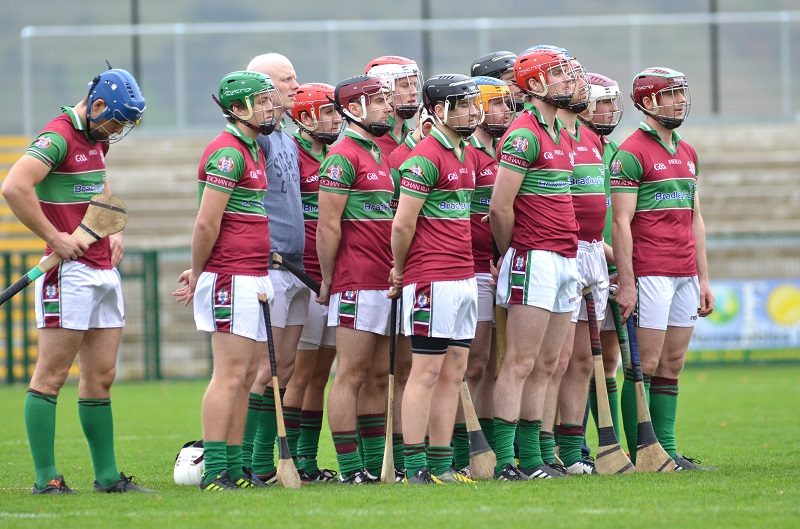
Mary K Burke
The Triangle
A wedge in Derry’s short North Atlantic coastline, ‘The Triangle’ is the term used to describe the area encompassed by the towns of Portstewart, Portrush and Coleraine. It’s a region which, up until recent years, hasn’t hit the GAA headlines.
So, take one-hundred people randomly selected from thirty-nine of Derry’s forty clubs and ask them to name one family associated with the GAA in Coleraine. For at least ninety-five of those people, the answer to that Family Fortunes style question will almost certainly be; ‘The McGoldricks’.
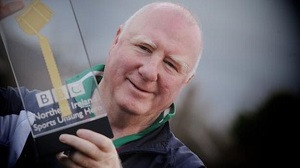
“Coming from Belfast, I was reared in the 50s and 60s playing both Gaelic football and hurling,” explains Seán McGoldrick.
“During the summer of 1994 Schira (Sean’s wife) and myself were in Belfast with the kids visiting one of my brothers. During the day we went across to Woodlands playing fields with hurleys that he had at home for a puck about. The Woodlands playing fields are on Finaghy Road on the site where up to the 1970s the main Twelfth of July Orange parade in Belfast used to gather.
“I came away that day thinking we should try the hurling in Eoghan Roe to see if there was any interest. The summers of the early nineties, weather-wise, were a far cry from the sorts of summers we have had in the last 10 years. The ceasefires had just been put in place and there was a sense that it would become less dangerous to be seen with hurleys in the Triangle area.”

And there immediately you get the first sense of the uniqueness of the club. They’ve had to fight to survive – a fight which still goes on to this day, although on less troubled fronts. But the whole experience has uniquely bonded at least two generations in double quick time.
Stony Ground
In 2013, the club, with grounds cut into rock within sight of the Bann estuary, celebrated fifty years in existence. They published a book to mark the occasion. The book’s title ‘And some fell on stony ground’ hints at an uncertain foundation, where a predecessor club, Mitchells, folded in the 1950s, but also one which has seen teams and generations ‘spring up’ without care for the burden of history or tradition.
The lack of convention, the sense of alternative and uniqueness of method is stamped all over the DNA of the club and its players – or the ‘surfers’ as they are affectionately known in Derry.
In some cases it’s method which has been borne out of that greatest motivator of invention – necessity. Following the best of GAA traditions, it’s self-help to the max.
With McGoldrick’s desire to see hurling take root in the Triangle Area again came Sunday morning coaching sessions on the Dominican pitches. The offer to attend was open to all, boys and girls, and from all backgrounds. Padraig (current senior team manager) and Susan Ó Mianain were there too alongside Micheal Dúbh and Schira McGoldrick, with contributions from Jamsie Forrestal from Cork and Pat Qualter from Galway.
“The youngsters who attended those sessions are mainstays of both today’s senior hurling and camogie teams,” explains McGoldrick.
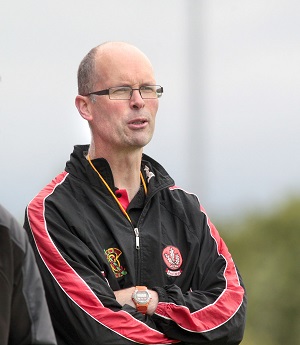
Picture Margaret McLaughlin
The man who also guided the club to an historic first Derry senior football championship in 2010 is referring to players such as Kieran Lagan, Anton Rafferty, Gráinne, Barry, Ciarán, Sean Leo and Méabh McGoldrick, Jane Carey, Orlagh Mullan and Pamela Frizelle – all now established and experienced heads around the club.
It’s a very heady mix when you do the homework.
Consider the panel for Sunday’s game: The McGoldricks’ parents are from Antrim and Derry City, with Niall Holly likewise. Ruairi Mooney has Tyrone and Down origins whilst Anton Rafferty’s father is from Glenullin, as are one half of the Mullans which we’ve already mentioned. Ruaidhri Leonard’s parents hail from Armagh, Pearse Dallas has strong Antrim connections and Kieran Lagan’s dad was from Lavey. Of the coaches, Padraig O Mainain is originally from Donegal via Derry city, Pat Cassidy, Slaughtneil, and Joe Passmore from Tyrone. And then Ciarán Gaile, Paddy Mullan, Ciarán Lagan and Thomas Magee’s parents, for example, hail from The Triangle.
There’s something of the commune about it all, but as John Keenan points out, the traditional GAA signposts are also never far away. The necessary dedication and altruism in the committee room is present in men like Kevin Mullan and Brendan McLernon, and with no with little talent.
“The point is, none of this (recent success) happens by accident,” said Keenan. “The club has now become part and parcel of the social fabric of the community up there. The kind of people who are now involved are the very reason that allows the association to punch above its weight. The volunteer effort that put in place the current facilities to start with; that organises the day to day running of the thing, and then the loyalty of its players to that effort, and themselves, is what makes that club not only function, but thrive.”
Having been Derry GAA chairperson when the historic first county senior football title was annexed, Keenan recalls with fondness the annual journeys to the Royal Court Hotel, Portrush for the club’s dinner dances.
“They shocked everyone in 2010. It was an unbelievable achievement,” he says. “I was invited to give a speech at their dinner dance that year and it was just after Coleraine Borough Council had awarded club of the year to the local cricket thirds team. I was very nervous as I hadn’t spoken publicly much until that point. I felt it was a slight on their achievements so I brought up the topic and the place erupted. The nerves soon settled after that.”
“I enjoyed those occasions because I always felt they were celebrating just being a club – that medals and cups were secondary to the whole thing. There was a real sense of that,” states Keenan.
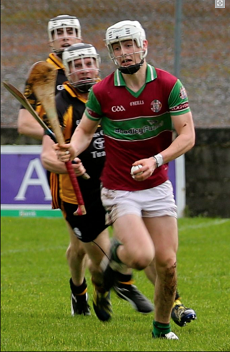
Above all, the unique cocktail that is Eoghan Rua comes out in the players. Like Eimear Mullan, they generally have a relaxed attitude to their craft, but one which thinly masks a total dedication to betterment and seeing just how good they can actually become.
Since Barry McGoldrick won an All-Ireland minor football medal with Derry in 2002, Eoghan Rua players have demonstrated their quality and their attitude to Gaelic games at intercounty level with Derry, no more so than last year when Thomas Magee captained the county minor team in the Ulster Hurling Championship.
“Thomas is a very talented hurler, of course,” says Stephen O’Kane, Derry minor hurling manager and the man who selected Magee as his skipper for 2015. “It was his attitude and work rate at training which marked him out as a leader though. Because of those personal traits, the rest of the team looked up to him naturally. An attitude like that is infectious for a panel.”
The Numbers Game
Hurling can be an unforgiving game. When mismatches occur, the term cricket score is never far behind.
Joe Passmore has seen some of the club’s underage teams take some almighty beatings. It fuels his thinking, even about this weekend’s game, and provokes an examination of the motivations surrounding underage hurling in general.
“I felt like telling our goalkeeper to simply stand aside and let them (the opposition) beat in the fifteenth goal, or whatever it was, just to prove a point,” he says, recalling one such mauling.
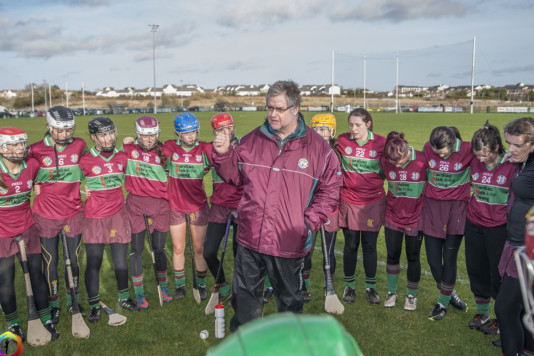
As a double All-Ireland winning camogie coach, Passmore is a man to be listened to when it comes to models of player development. Recent years have seen some of the club’s underage teams enter Antrim leagues. It’s a rationale which Passmore is keen to explain:
“Occasionally in any given year the club may not have the numbers to field in a given age group which is regrettable and not an ideal situation. Then, in other age groups, we can field but only just – so we take a lot of beatings. It’s difficult to find our level in Derry as there are so few teams.
“We are totally committed to the county but need more competitions like the u13 league which Kevin Hinphey runs, and which allows for proper grading. Competitions like the Ulster Féile were great experiences for our young lads because of the range of levels a greater number of teams brings. They’re the exception though, unfortunately.”
It’s an experience which isn’t new to the club. The groups which McGoldrick and company began on the Dominican pitches often struggled to compete with more established hurling clubs. However, the setbacks were merely temporary.
“(The result is that) the focus is on taking part, developing players rather than winning which can be all consuming elsewhere,” explains Passmore. “Each club has their own DNA and that’s ours. Our players are no less skilful, dedicated or interested in hurling; there are just less of them.”
“All the players fielding on Sunday (in Croke Park) have come through the unique experience of being an Eoghan Rua hurler,” he says.
“We feel that we’re playing a different game than other clubs because of unique circumstances.
“If getting to this final encourages a few more wee lads to take up the sport, then that in itself will have made it all worthwhile,” he concludes.
They may have sprung up quickly but after three All-Ireland finals in three different codes, you get the feeling the roots may now take a firmer hold.

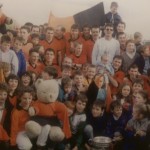
Very stony ground allright… being a parent of 3 ER past and present players it has always been an upward struggle – remember playing camogie/hurling with the lads in a community field in Coleraine 18 odd years ago just to make the point that we exist. Local police would have (and have done locally in my time) arrested children coming home from school practice (hurls in hand) for having offensive weapons. That’s how it was, and that’s what this club has quietly stood against, bit by bit, non-aggressively, to what we have achieved thus far. Take my hat off lads! Comhghairdeachais libh!
Eoghan Rua Abú!